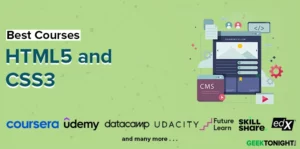Virtual reality has gained immense popularity in recent years, offering immersive experiences and transformative applications across various industries. In this article, we have compiled a list of Best Virtual Reality Courses that cater to beginners and experienced developers alike. Join us as we delve into the key features and highlights of these courses, helping you find the ideal path to becoming a proficient VR developer.
Whether you are an aspiring game developer, a designer, or an innovator interested in pushing the boundaries of VR technology, this article serves as your guide to discovering the best VR courses suited to your learning goals and career aspirations.
Why Learn Virtual Reality?
VR is an emerging and rapidly evolving field with enormous potential for innovation. By mastering VR development, developers can tap into a growing market and create immersive experiences for various industries. As VR technology becomes more accessible and affordable, it is expected to become increasingly integrated into everyday life and making it essential for developers to stay ahead of the curve. The estimated total pay for an AR/VR Developer is $102,974 per year in the United States area, with an average salary of $91,906 per year.
Table of Content
- 1 Best Virtual Reality Courses, Certification, Tutorials, Training, Classes Online
- 1.1 Virtual Reality Specialization by University of London [Coursera]
- 1.2 Unreal Engine 5 C++ Developer: Learn C++ & Make Video Games [Udemy]
- 1.3 Virtual Reality and Augmented Reality by MIT xPRO [Emeritus]
- 1.4 Professional Certificate in AR/VR Development and 3D Graphics by NYU Tandon [Emeritus]
- 1.5 Introduction to Virtual Reality [Udacity]
- 1.6 Unreal Engine 4: Project Based VR Course for Arch Viz in UE4 [Udemy]
- 1.7 Professional Certificate in Virtual Reality (VR) App Development by UC San Diego [edX]
- 1.8 Complete C# Unity Game Developer 3D [Udemy]
- 1.9 Unity ® Virtual Reality (VR) Development: No Coding Approach [Udemy]
- 2 FAQ
Our product recommendations are unbiased and based on an independent review process. We may receive a commission for links to recommended partners. See our advertiser disclosure for more information.
Best Virtual Reality Courses, Certification, Tutorials, Training, Classes Online
- Best Overall Virtual Reality Specialization by University of London [Coursera]
- Best for All Unreal Engine 5 C++ Developer: Learn C++ & Make Video Games [Udemy]
- Best for Working Professionals Virtual Reality and Augmented Reality by MIT xPRO [Emeritus]
- Best for Developers & Engineers Professional Certificate in AR/VR Development and 3D Graphics by NYU Tandon [Emeritus]
- Best for Free Introduction to Virtual Reality [Udacity]
- Best for Project Unreal Engine 4: Project Based VR Course for Arch Viz in UE4 [Udemy]
- Best for App Developers Professional Certificate in Virtual Reality (VR) App Development by UC San Diego [edX]
- Best for Game Developer Complete C# Unity Game Developer 3D [Udemy]
- Best for Unity Unity ® Virtual Reality (VR) Development: No Coding Approach [Udemy]
Virtual Reality Specialization by University of London [Coursera]
Virtual Reality Specialization on Coursera is a comprehensive program that offers learners an in-depth understanding of virtual reality (VR) technology and its applications. This specialization is designed for individuals who want to explore the exciting field of VR and develop the skills necessary to create immersive virtual experiences.
Course Instructor
The course is taught by experienced instructors who possess expertise in the field of virtual reality. Each course within the specialization is led by knowledgeable professionals who are passionate about VR and its potential. Their expertise and enthusiasm contribute to an engaging and informative learning experience.
What you’ll learn:
- Explore how you interact with a VR world, including the concepts and technologies of VR interaction.
- Utilize the skills you have learnt to create your own VR game or project.
- Learn the basics of 3D graphics, how we create objects and how to lay them out to create an environment.
Pros & Cons
Pros
- Comprehensive Curriculum
- Hands-on Projects
- Industry-Relevant Insights
Cons
- Technical Prerequisites
Key Highlights & Learning Objectives
- Gain a foundational understanding of virtual reality and potential applications across various industries.
- Explore the tools and platforms used in VR development, such as Unity and Unreal Engine
- Understand the principles of designing effective and immersive VR experiences
- Learn the technical aspects of VR development including 3D modeling and physics simulation
- Discover the diverse applications of VR in fields such as gaming, education and healthcare
- Apply the knowledge gained throughout the specialization to create a VR project showcasing your proficiency in VR development.
Who is it for?
The Virtual Reality Specialization is suitable for individuals interested in exploring the field of virtual reality and developing the skills necessary for VR application development. Whether you are a programmer, designer, student, or enthusiast, this specialization provides a solid foundation in VR technology and equips you with the knowledge and skills needed to create immersive virtual experiences.
Rating: 4.6/5
Students Enrolled: 55,539
Duration: 6 months, 4 hours/week
Unreal Engine 5 C++ Developer: Learn C++ & Make Video Games [Udemy]
The Unreal Engine Developer Course available on Udemy is a comprehensive program designed to teach learners how to create games using Unreal Engine, a powerful and widely used game development engine. This course is ideal for individuals interested in game development and want to learn how to utilize the Unreal Engine to build immersive and visually stunning games including Virtual Reality games.
Course Instructor
The course is instructed by Ben Tristem who possesses extensive knowledge and practical experience in working with Unreal Engine. He delivers the course material in a clear and engaging manner, providing step-by-step guidance and real-world examples. Their expertise and passion for game development ensure an immersive learning experience.
Pros & Cons
Pros
- Comprehensive Curriculum
- Hands-on Projects
- Active Community and Support
Cons
- Prior Knowledge Required
Key Highlights & Learning Objectives
- Gain a solid understanding of Unreal Engine and its features, including its powerful visual scripting system, Blueprints.
- Learn the foundational concepts of game development including game mechanics, level design, character control, and physics simulation.
- Explore Unreal Engine’s visual scripting system, Blueprints, and learn how to create gameplay logic, control animations, and implement game features without coding.
- Understand how to import and manage assets such as 3D models, textures, and sound into Unreal Engine, and learn the basics of creating materials and lighting.
- Learn techniques for optimizing game performance, reducing loading times, and improving frame rates to create smooth and responsive gameplay experiences.
Who is it for?
The Unreal Engine Developer Course is suitable for individuals interested in game development, whether they are beginners or have some prior programming experience. This course provides valuable insights and practical knowledge for anyone who wants to create games using Unreal Engine and take their game development skills to the next level.
This course involves the use of Unreal Engine to create Virtual Reality applications. If you want to learn more, you can check out our Best Unreal Engine Courses to gain in-depth understanding of this exciting technology.
Rating: 4.7/5
Students Enrolled: 361,886
Duration: 30 hours
Virtual Reality and Augmented Reality by MIT xPRO [Emeritus]
The Virtual Reality and Augmented Reality course offered by MIT Executive Education is a specialized program designed to provide executives and professionals with a comprehensive understanding of virtual reality (VR) and augmented reality (AR) technologies. This course explores the potential applications, challenges, and implications of VR and AR in various industries, equipping participants with the knowledge needed to leverage these technologies in their organizations.
Course Instructor
The course is led by esteemed faculty members from MIT, renowned for their expertise in VR, AR, and related fields. The instructors bring a wealth of knowledge and experience to the course, providing participants with valuable insights and thought leadership in the rapidly evolving landscape of VR and AR technologies.
Pros & Cons
Pros
- Prestigious Institution
- Practical Applications
- Networking Opportunities
Cons
- Cost and Time Commitment
Key Highlights & Learning Objectives
- Gain an understanding of the fundamental concepts, technologies, and terminology associated with VR and AR.
- Explore the potential uses of VR and AR in different industries, such as healthcare, education, architecture, entertainment, and training.
- Learn about the principles of designing effective and immersive VR and AR experiences, considering factors such as user interaction, interface design, and human factors.
- Technological Considerations: Understand the technical aspects of VR and AR, including hardware, software, tracking systems, and content creation tools.
- Explore real-world case studies and industry examples to understand the practical applications and challenges of implementing VR and AR solutions.
Who is it for?
The Virtual Reality and Augmented Reality course is specifically designed for executives, professionals, and decision-makers who want to gain a comprehensive understanding of VR and AR technologies and their impact on business and society. This course is suitable for individuals in diverse industries who are interested in exploring the potential of VR and AR for innovation, strategic planning, and business transformation.
Rating: 4.7/5
Duration: 8 weeks, online 5–6 hours per week
Professional Certificate in AR/VR Development and 3D Graphics by NYU Tandon [Emeritus]
Professional Certificate in AR and VR offered by NYU Tandon School of Engineering provides professionals with a comprehensive program focused on augmented reality (AR) and virtual reality (VR) technologies. This certificate program is designed to equip learners with the knowledge and skills needed to excel in the rapidly evolving fields of AR and VR, opening up new opportunities for innovation and professional growth.
Course Instructor
The course is taught by experienced instructors who are experts in the field of AR and VR technologies. These instructors possess both academic and industry backgrounds, providing learners with a well-rounded perspective on the subject matter. They deliver the course content in a clear and engaging manner, offering practical insights and real-world examples.
Pros & Cons
Pros
- Comprehensive Curriculum
- Flexibility and Accessibility
- Industry Connections
Cons
- Prerequisite Knowledge Required
Key Highlights & Learning Objectives
- Gain a solid understanding of the concepts, principles, and applications of AR and VR technologies.
- Learn the technical aspects of AR and VR development including creating immersive experiences, designing interactive interfaces, and implementing realistic simulations.
- Understand the design principles specific to AR and VR, including user experience (UX), user interface (UI) design, spatial audio, and visual storytelling.
- Explore the diverse applications of AR and VR across industries such as gaming, education, healthcare, marketing, and engineering.
Who is it for?
The Professional Certificate in AR and VR is designed for professionals seeking to enhance their knowledge and skills in AR and VR technologies. This program is suitable for individuals in various roles, including developers, designers, engineers, project managers, and entrepreneurs, who want to leverage the power of AR and VR to drive innovation in their respective industries.
Rating: 4.7/5
Students Enrolled: 24,682
Duration: 7 months, online 15-20 hours per week
Introduction to Virtual Reality [Udacity]
Introduction to Virtual Reality Course offered by Udacity is a beginner-level course that provides learners with a foundational understanding of virtual reality (VR) technology and its applications. This course is designed to introduce participants to the basic concepts and principles of VR, allowing them to explore this immersive technology and its potential.
Course Instructor
The course is taught by knowledgeable instructors who have expertise in virtual reality technology and its various aspects. The instructors deliver the course content in a clear and engaging manner, guiding learners through the fundamental concepts of VR. Their expertise ensures a comprehensive introduction to VR technology and its applications.
Pros & Cons
Pros
- Beginner-Friendly
- Comprehensive Introduction
- Practical Exercises
Cons
- Limited Depth
Key Highlights & Learning Objectives
- Gain an understanding of the core principles, history, and components of virtual reality technology.
- Explore different types of VR hardware devices such as headsets and controllers as well as the software tools and platforms used in VR development.
- Understand the basics of VR content creation and development, including 3D modeling, environment design, and programming for VR experiences.
- Discover the wide range of applications of VR across industries such as gaming, education, training, healthcare, and more.
- Explore emerging trends and advancements in VR technology such as augmented reality (AR), mixed reality (MR), and the potential impact on various industries.
Who is it for?
Introduction to Virtual Reality is suitable for individuals who are curious about virtual reality and want to explore its foundational concepts. This course is ideal for beginners, enthusiasts, or professionals from various fields who want to understand the fundamentals of VR technology and its potential applications.
Rating: 4.5/5
Duration: 2 Weeks
Unreal Engine 4: Project Based VR Course for Arch Viz in UE4 [Udemy]
The 3ds Max & Unreal Engine 4 course available on Udemy offers a comprehensive program that combines 3ds Max, a popular 3D modeling and rendering software, with Unreal Engine 4, a powerful real-time game engine. This course focuses on teaching learners how to create visually stunning architectural visualizations in real-time using these industry-standard tools.
Course Instructor
The course is led by Matt Sonic and Vasanth Mohan, both of whom are experienced instructors who possess expertise in 3ds Max, Unreal Engine, and architectural visualization. Their expert instruction delivers the course content in a clear and structured manner, providing step-by-step guidance and practical examples.
Pros & Cons
Pros
- Comprehensive Curriculum
- Industry-Standard Tools
- Practical Examples and Projects
Cons
- Prerequisite Knowledge Required
Key Highlights & Learning Objectives
- Gain a foundational understanding of 3ds Max, including its interface, modeling tools, materials, and lighting techniques.
- Explore the capabilities of Unreal Engine 4 specifically for architectural visualization projects
- Learn how to seamlessly integrate 3ds Max and Unreal Engine to create a streamlined workflow
- Understand the principles and techniques of real-time rendering, including optimization, scene organization, and asset management for efficient real-time visualization.
- Discover how to create interactive walkthroughs, interactive objects and user interactions
- Apply the knowledge gained throughout the course by working on hands-on projects, building a portfolio of realistic architectural visualizations.
Who is it for?
The 3Ds Max & Unreal Engine 4: Easy Real-Time for Arch Viz course is suitable for 3D artists, architects, interior designers, students, or anyone interested in architectural visualization. This course is designed for individuals who want to enhance their skills in creating realistic architectural visualizations using 3ds Max and Unreal Engine.
Rating: 4.5/5
Students Enrolled: 10,432
Duration: 8 hours
Professional Certificate in Virtual Reality (VR) App Development by UC San Diego [edX]
The Virtual Reality App Development Certificate offered by UC San Diego on edX is a comprehensive program designed to equip learners with the skills and knowledge necessary to develop virtual reality (VR) applications. This certificate program focuses on the technical aspects of VR app development and provides learners with a solid foundation in creating immersive VR experiences.
Course Instructor
The course is taught by experienced instructors who possess expertise in VR app development and related technologies. These instructors have academic and industry backgrounds, providing learners with a balanced perspective on the subject matter. They deliver the course content in a structured and engaging manner, offering practical insights and real-world examples.
Pros & Cons
Pros
- Comprehensive Curriculum
- Hands-on Learning
Cons
- Time Commitment
Key Highlights & Learning Objectives
- Gain an understanding of the principles, technologies, and applications of virtual reality.
- Explore the software tools and platforms used in VR app development, such as Unity and Unreal Engine, and learn how to create immersive VR experiences from scratch.
- Learn how to create and import 3D models, textures, and other assets into VR environments, ensuring realistic and visually appealing experiences.
- Explore techniques for optimizing VR app performance, reducing latency, and ensuring smooth and immersive user experiences.
Who is it for?
The Virtual Reality App Development Certificate is suitable for aspiring VR app developers, software engineers, computer science students, and professionals who want to enhance their skills in VR app development. This program is designed for individuals who have a basic understanding of programming and are interested in creating immersive VR experiences.
Rating: 4.7/5
Duration: 5 months, 5-9 hours/week
Complete C# Unity Game Developer 3D [Udemy]
The “Complete Unity Game Development Course – Part 2” available on Udemy is an extensive program designed to further enhance learners’ skills in game development using the Unity game engine. This course is a continuation of Part 1 and focuses on advanced concepts and techniques to create more complex and polished games.
Course Instructor
The course is led by experienced instructors who possess expertise in Unity game development. The instructors have a deep understanding of game design principles and programming, providing learners with valuable insights and practical guidance throughout the course. Their expertise ensures a comprehensive learning experience.
Pros & Cons
Pros
- Comprehensive Curriculum
- Hands-on Projects
- Real-World Examples
Cons
- Prerequisite Knowledge Required
Key Highlights & Learning Objectives
- Explore advanced game mechanics and features such as artificial intelligence, procedural generation, physics simulation, and multiplayer functionality.
- Learn techniques to enhance the visual appeal and overall quality of game projects, including lighting, particle effects, sound design, and user interface design.
- Dive deeper into scripting and programming with C# in the Unity environment
- Understand strategies and best practices for optimizing game performance, including frame rate optimization, memory management, and asset optimization.
- Apply the acquired knowledge by working on hands-on projects, creating complete and polished games throughout the course.
Who is it for?
The Complete Unity Game Development Course – Part 2 is suitable for individuals who have a basic understanding of Unity and game development and want to advance their skills further. This course is ideal for aspiring game developers, programmers, and students who want to create more complex and polished games using Unity.
Rating: 4.7/5
Students Enrolled: 227,562
Duration: 31 hours
Unity ® Virtual Reality (VR) Development: No Coding Approach [Udemy]
The “Unity VR Development – No Coding Required” course available on Udemy offers a unique opportunity for learners to dive into virtual reality (VR) development using Unity without the need for coding. This course caters to individuals who want to explore VR development and create immersive experiences without extensive programming knowledge.
Course Instructor
The course is led by Chris Coutinho who possesses expertise in Unity and VR development. He guides learners through the course content in a clear and concise manner, providing step-by-step instructions and practical examples. His expertise in both Unity and VR development ensures an engaging and accessible learning experience.
Pros & Cons
Pros
- No Coding Required
- User-Friendly Tools
- Practical Projects
Cons
- Limited Scope
Key Highlights & Learning Objectives
- Gain a foundational understanding of Unity and VR technologies, exploring their capabilities and potential applications.
- Learn how to import and manipulate 3D models, audio, and other assets to create immersive VR environments within Unity.
- Understand the principles and best practices for designing intuitive and immersive user interactions in VR, without the need for coding.
- Explore techniques for creating engaging VR environments, designing levels, and implementing interactive elements to enhance the user experience.
Who is it for?
The “Unity VR Development – No Coding Required” course is suitable for individuals who have little to no coding experience but are interested in exploring VR development using Unity. This course caters to beginners, hobbyists, or individuals from non-technical backgrounds who want to create immersive VR experiences without writing code.
Rating: 4/5
Students Enrolled: 3,161
Duration: 15 hours
FAQ
How can I learn virtual reality?
Learning virtual reality (VR) involves a combination of technical skills and practical experience. Here are a few steps to get started:
Understand the Fundamentals: Begin by familiarizing yourself with the basic principles and concepts of VR, including hardware components, software development, and design considerations.
Choose a Development Platform: Select a VR development platform that suits your interests and goals. Some popular platforms include Unity3D, Unreal Engine, and WebVR frameworks.
Learn Programming: Acquire programming skills in languages commonly used for VR development, such as C#, C++, or JavaScript. These languages are widely used in VR development frameworks and engines.
Enroll in VR Courses or Tutorials: Explore online courses, tutorials, and learning resources dedicated to VR development. These resources often provide comprehensive instruction on VR design, 3D modeling, interaction development, and optimization techniques.
Are VR jobs in demand?
Yes, VR jobs are in demand, and the demand is expected to grow in the coming years. The VR industry is expanding rapidly, with increased adoption across various sectors such as gaming, entertainment, education, healthcare, and architecture. As more organizations recognize the potential of VR technology, there is a growing need for skilled professionals who can develop, design, and implement VR experiences.












